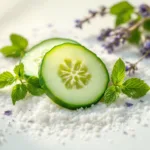The Ultimate Guide to Coconut Oil: Benefits for Hair, Skin, and Overall Wellness
Introduction
Coconut oil has been a staple in beauty and wellness routines for centuries, revered for its versatility and potent natural properties. From ancient Ayurvedic practices to modern dermatology, this tropical elixir continues to gain recognition for its ability to nourish hair, moisturize skin, and even support overall health. But what makes coconut oil so special, and how can you harness its full potential?
This comprehensive guide explores the science-backed benefits of coconut oil for hair and skin, debunks common myths, and provides practical tips for incorporating it into your daily routine. Whether you’re looking to repair damaged hair, achieve glowing skin, or simply adopt a more natural approach to self-care, this article will equip you with the knowledge to use coconut oil effectively.
1. The Science Behind Coconut Oil
Composition and Key Nutrients
Coconut oil is extracted from the meat of mature coconuts and is composed primarily of saturated fats, particularly medium-chain fatty acids (MCFAs) like lauric acid, capric acid, and caprylic acid. These compounds contribute to its antimicrobial, anti-inflammatory, and deeply moisturizing properties.
- Lauric Acid (50% of total fat content): Known for its antibacterial and antiviral effects.
- Capric and Caprylic Acid: Help combat fungal infections and support skin barrier function.
- Vitamin E: A powerful antioxidant that promotes skin repair and reduces oxidative stress.
- Polyphenols: Provide anti-aging benefits by neutralizing free radicals.
Types of Coconut Oil
Not all coconut oils are created equal. The two main types are:
- Virgin (Unrefined) Coconut Oil – Extracted without chemical processing, retaining maximum nutrients and a natural coconut aroma. Best for cosmetic and culinary use.
- Refined Coconut Oil – Processed with heat and chemicals, resulting in a neutral smell and higher smoke point but fewer bioactive compounds. Ideal for high-heat cooking but less beneficial for skin and hair.
For beauty and wellness purposes, virgin coconut oil is the superior choice due to its purity and nutrient density.
2. Coconut Oil for Hair: Benefits and Application
Hair Growth and Strength
Coconut oil’s unique molecular structure allows it to penetrate the hair shaft, reducing protein loss and strengthening strands from within. Studies have shown that it outperforms mineral and sunflower oils in preventing hair damage caused by grooming and environmental stressors.
Key Benefits:
- Reduces breakage and split ends
- Promotes scalp health by fighting dandruff-causing fungi
- Enhances shine and softness
How to Use Coconut Oil for Hair
1. Deep Conditioning Treatment
- Warm 2-3 tablespoons of virgin coconut oil in your hands.
- Apply from roots to tips, focusing on dry or damaged areas.
- Cover with a shower cap and leave for 30 minutes (or overnight for intense repair).
- Rinse with a mild shampoo.
2. Scalp Massage for Dandruff Control
- Mix coconut oil with a few drops of tea tree oil for antifungal benefits.
- Massage into the scalp for 5-10 minutes before washing.
3. Leave-In Protector for Frizz Control
- Rub a pea-sized amount between palms and smooth over damp hair to tame frizz and add shine.
Pro Tip: Avoid excessive use on fine or oily hair, as it may weigh hair down.
3. Coconut Oil for Skin: A Natural Moisturizer and Healer
Skin Hydration and Barrier Repair
Unlike many commercial moisturizers that sit on the skin’s surface, coconut oil absorbs deeply, replenishing lipids and locking in moisture. Its antimicrobial properties also make it effective for acne-prone and sensitive skin when used correctly.
Key Benefits:
- Soothes eczema and psoriasis flare-ups
- Reduces inflammation and redness
- Acts as a natural makeup remover
- Delays signs of aging by improving elasticity
How to Use Coconut Oil for Skin
1. Daily Moisturizer
- Apply a thin layer to damp skin after showering for optimal absorption.
- Best for dry or normal skin types; those with oily skin should use sparingly.
2. Oil Cleansing Method
- Combine coconut oil with castor oil (for acne-prone skin) and massage onto the face.
- Wipe off with a warm cloth for a deep cleanse without stripping natural oils.
3. Natural Lip Balm
- Apply directly to chapped lips for instant hydration.
Caution: Coconut oil is comedogenic (pore-clogging) for some individuals. Patch-test before full-face application.
4. Debunking Common Myths About Coconut Oil
Myth 1: Coconut Oil Clogs Pores for Everyone
While it can exacerbate acne in some people, others tolerate it well. Factors like skin type and purity of the oil play a role. Opt for fractionated coconut oil (which lacks pore-clogging lauric acid) if prone to breakouts.
Myth 2: It Makes Hair Greasy
Overapplication is usually the culprit. Using small amounts and focusing on ends rather than roots prevents buildup.
Myth 3: All Coconut Oils Are the Same
As discussed earlier, refined coconut oil lacks many of the beneficial compounds found in virgin coconut oil. Always check labels for purity.
5. Beyond Beauty: Additional Uses of Coconut Oil
- Oil Pulling: Swishing coconut oil in the mouth for 10-15 minutes improves oral hygiene.
- Cuticle Care: Softens dry cuticles and strengthens nails.
- Natural Shaving Cream: Provides a smooth glide and prevents razor burn.
Conclusion: Is Coconut Oil Worth the Hype?
Coconut oil is a powerhouse ingredient with proven benefits for hair, skin, and overall wellness. Its deep-moisturizing, antimicrobial, and reparative properties make it a valuable addition to any beauty regimen—when used correctly.
Final Recommendations:
- For Hair: Use as a pre-wash treatment or scalp therapy 1-2 times per week.
- For Skin: Ideal for dry or combination skin; patch-test if acne-prone.
- Quality Matters: Always choose organic, virgin coconut oil for maximum benefits.
By understanding its properties and tailoring usage to your needs, you can unlock the full potential of this natural wonder. Whether you’re combating dryness, seeking healthier hair, or embracing clean beauty, coconut oil offers a simple yet effective solution rooted in nature.
Would you like a downloadable cheat sheet on coconut oil uses? Let us know in the comments!









Add comment